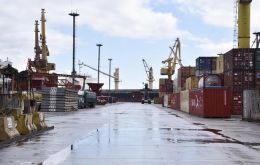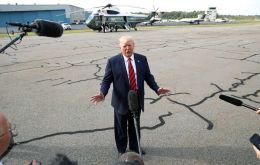MercoPress. South Atlantic News Agency
Tag: recession
-
Tuesday, November 19th 2019 - 06:38 UTC
Global trade forecasted to remain “below trend” in fourth quarter, WTO

The World Trade Organization said on Monday that growth in global goods trade is expected to remain “below trend” in the fourth quarter amid tensions and rising tariffs in key sectors.
-
Wednesday, October 9th 2019 - 09:55 UTC
New IMF chief claims the world economy is in a “synchronized slowdown”

Grinding trade disputes are undermining the global economy, which is set to see its slowest growth in nearly a decade, the new IMF chief said on Tuesday. Research shows the impact of the trade conflict is widespread and countries must be ready to respond in unison with cash infusions, Kristalina Georgieva said in her first speech as managing director of the International Monetary Fund.
-
Saturday, October 5th 2019 - 09:37 UTC
US unemployment at a record 50-year low in September, but manufacturing fell sharply

The U.S. unemployment rate dropped to near a 50-year low of 3.5per cent in September, with job growth increasing moderately, suggesting the slowing economy could avoid a recession for now despite trade tensions that are hammering manufacturing.
-
Thursday, September 19th 2019 - 10:12 UTC
Uruguay avoids recession, but the economy is stagnant

The Central Bank of Uruguay (BCU) released the report of the country's quarterly economic situation, which reports that the Uruguayan economy grew by only 0.1% year-on-year and 0.3% in the second quarter of the year, compared to the first three months of the year, when it registered a 0.1% drop.
-
Wednesday, September 11th 2019 - 09:24 UTC
Brazilian officials cautiously say the worst of recession is over, but anticipate no easing of austerity

Brazil’s government on Tuesday slightly raised its 2019 economic growth forecast and said the worst for the economy is probably behind it but showed no sign it is willing to ease up on its commitment to austerity and strict fiscal discipline.
-
Wednesday, August 21st 2019 - 09:48 UTC
The word that begins with “R” that scares Donald Trump

United States President Donald Trump on Tuesday insisted that recession - a potentially dangerous blow to his re-election next year - is not in the cards. But he indicated he's preparing just in case.
-
Friday, July 26th 2019 - 09:59 UTC
Argentina's economy lifting out of recession: activity rises in May for the first time in a year

Argentina’s economic activity rose for the first time in over a year in May, a rare boost for President Mauricio Macri as he looks to dig the South American country out of a crippling recession ahead of presidential elections later this year.
-
Friday, June 14th 2019 - 09:40 UTC
Argentine inflation 3.1% in May and 57.3% in twelve months

Argentine consumer prices rose 3.1% in May, the government’s official statistics agency said on Thursday. Accumulated inflation in the 12 months through May came to 57.3%, and year-to-date inflation was 19.2%, according to the National Census and Statistics Institute, known by its acronym, INDEC.
-
Thursday, June 6th 2019 - 08:41 UTC
Argentine construction industry contracts 7.5% in April and 10.3% in four months

The construction industry in Argentina contracted 7.5% last April, the eighth consecutive month, with an overall drop of 10.3% in the first four months of the year. According to the country's stats office Indec, the Indicator of Construction Activity, during April fell 0.3% from March.
-
Wednesday, June 5th 2019 - 21:00 UTC
Uruguay: Finances don't grow; Economy Minister estimates an improvement for the second semester, as Macri did

Uruguay is experiencing, in recent months, a marked drop in investment and the generation of employment. Uruguayan Economy Minister Danilo Astori admitted Wednesday the fall of public accounts, with an annualized fiscal deficit in April that was 4.8% of GDP, and opted to provide greater incentives to investors and entrepreneurs. The Uruguayan press accuses the government of betting on the hope that the results will begin to be felt in the second half of the year, as it was heard a while ago in Argentina under the administration of President Mauricio Macri.
